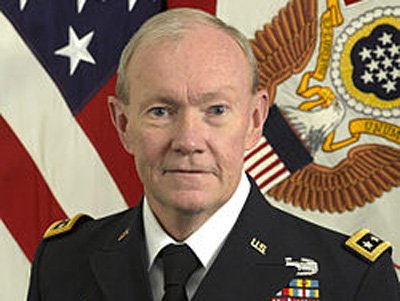
US top military officer General Martin Dempsey has claimed that Iran is helping to build and train a militia in Syria to prop up embattled President Bashar al-Assad.
General Martin Dempsey said the militia was intended to take the pressure off battle-weary Syrian regime forces.
Iran has described Syria as part of a vital regional alliance that Tehran will not allow to be broken.
Meanwhile, a summit of Islamic countries is due to suspend Syrian membership, despite Iranian objections.
The 57-member Organisation of Islamic Co-operation is expected to endorse the decision of its foreign ministers at the summit in Mecca, Saudi Arabia.
Saudi state TV showed King Abdullah welcoming leaders with Iranian President Mahmoud Ahmadinejad at his side. They were shown talking and laughing together.
Gen. Martin Dempsey, chairman of the US Joint Chiefs of Staff, said Syrian regime forces would be “taxed” after fighting for almost 18 months.

“They are having re-supply problems, they are having morale problems, they are having the kind of wear-and-tear that would come of being in a fight for as long as they have,” he said.
He said Iran was training a militia “made up of Syrians, generally Shia and some Alawite,” a reference to the minority Shia Islam offshoot to which President Assad belongs.
It was called “jaish ashaabi” or “army of the people”, Gen. Martin Dempsey said.
The mainly Sunni Muslim rebels in Syria are being backed by Sunni-ruled Arab states such as Saudi Arabia and Qatar, as well as Turkey.
Speaking at the same news conference, US Defence Secretary Leon Panetta said it had become obvious that Iran was providing assistance and training for the Syrian regime.
“We do not think that Iran ought to be playing that role at this moment in time,” he said.
“It is adding to the killing that’s going on in Syria, and it tries to bolster a regime that we think ultimately is going to come down.”
Gen. Martin Dempsey said Washington had held talks with Syria’s neighbors Jordan and Turkey about the possible need for a safe zone, amid an influx of refugees fleeing the fighting.
“With a safe haven would probably come some form of no-fly zone, but we are not planning anything unilaterally,” he said.
Gen. Martin Dempsey also said it appeared that rebels had recently shot down a Syrian warplane, despite Damascus insisting that it had suffered a technical fault.
However, he said there was no indication that the rebels were armed with heavy weapons or surface-to-air missiles.
He said the jet could have been brought down with small-arms fire.